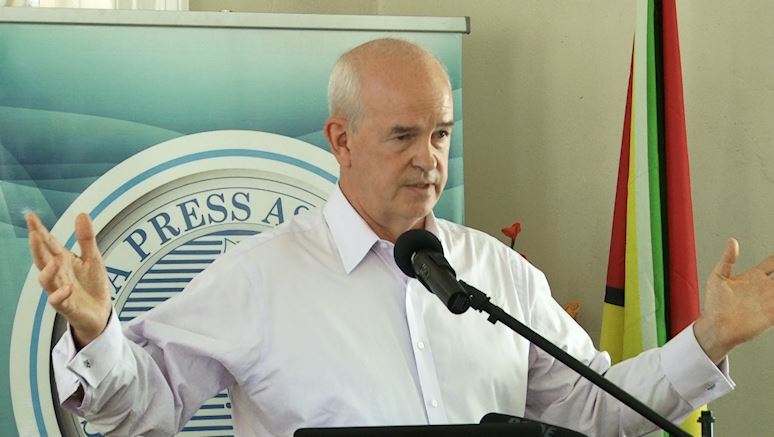A sustainability scientist on a visit to Guyana has described ExxonMobil as an excellent company, but said Guyana needs to ensure that the oil-giant complies with necessary environmental safeguards.
Director of Julie Ann Wrigley Global Institute of Sustainability at Arizona State University, Gary Dirks is on a visit to Guyana through Conservation International, which is rolling out its funding from the ExxonMobil Foundation.
On Friday at lunch, he was at Moray House Trust in Georgetown for a lecture hosted by the Guyana Press Association.
The topic of discussion was whether Guyana can really pump billions of barrels of oil deep sea and still pursue a so-called green economy, that is, pursuing development without degrading the environment.
For Professor Dirks, the answer is yes.
“Yes, you can.
“There is absolutely no reason why you can’t have a green growth agenda pursued aggressively and being an oil producing nation at the same time,” he stated.
Professor Dirks said the resources offshore Guyana, which ExxonMobil will begin producing in less than two years, can spur economic development, as oil is very much needed.
“The world would die without oil right now, because the energy that is vital functioning of society comes from oil today.
“Therefore, we have to provide these resources…,” he stated.
He added: “The world needs this oil, and frankly, if done right, the country of Guyana can benefit from it.”
Professor Dirks once worked with British Petroleum, and was a fierce competitor of ExxonMobil. But while he praised the operations of the company, he said Guyana must make sure it meets the environmental checks and balances.
“You have to ensure ExxonMobil does a good job of protecting the environment where they are in development,” he warned.
Professor Dirks noted that it would be the responsibility of citizens, the press and the government to ensure that ExxonMobil in fact does the things they say they will do.
“They are an excellent oil company, they are incredibly skilled at what they do.
“There is nobody whose technology is any better than theirs, there is nobody that is more disciplined in the way they do things,” Professor Dirks noted.
“They will go out of their way to make sure that they don’t have accidents, that they don’t do things that will in some sense compromise the environment for your fisheries, or for your coastal areas,” he added.
But then came the warning: “But they have to be watched, like anybody else.”
Professor Dirks noted that the advent of oil is not the first time resources has come to the forefront in Guyana, but the country needs to think about what is the best way to use those resources, “what sectors of the economy do you want to develop and how do you see anyone of them to be developed.”
With this careful planning, he said the country can minimise its environmental footprint, while at the same time raising the standard of living for the population.
For one, he said the dependency on fossil fuels can be phased out by pursuing renewable energy sources.
For agricultural sectors facing challenges, he suggested evolving those sectors so they become sustainable.
Forestry and eco-tourism can also be pursued sensibly so as not to undermine the sense that Guyana is a green economy.
But he said that it is “very important” for citizens to be involved in the planning for the future.












